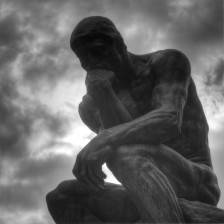As a kid, I saw a movie where a family is brutally murdered before their child who helplessly watches the crime but is unable to do anything because of his age and limitations. The child, of course, then grows up to avenge his family’s murder, just like countless other movies that come out every year. But, the scene of the helpless child had a profound impact on me. Would I be able to save my family, if something happened to them? The answer was frustratingly ‘no’.
It became a constant worry at the back of my mind, that later manifested into low self-confidence that affected various aspects of my life. (Talk about pressures of growing up). It was only when, years later, I countered this fear with logic, that my mind calmed down. But, it would be a lie to say I still don’t panic sometimes.
When was the last time you saw news on the TV and not feel disheartened or dejected or felt that the world was going to the dogs? But, aren’t we living in one of the most peaceful times known to man?
Does it mean, we should never read/see/listen to contradictory opinions or avoid anything that might put us to discomfort or challenge our notions. No. We can’t get stuck in a filter bubble. By all means we need to expose ourselves to counter arguments and view points different than ours, that is how we grow. But, by asking ourselves what the intent of the piece we are looking at or listening to, is, we can decipher what version of the world it wants to portray. Is it portraying the world as crap? True. The world IS crap. Is it portraying the world as beautiful? True. The world IS beautiful. If we can just remember the world isn’t always as bad as how Ram Gopal Varma portrays it nor is it as romantic and rich as how Rajashree production’s portray it; we are good.
But, I cannot stress enough that, whatever we see/read/listen colour the glasses through which we see the world. They seep into our beliefs and have tremendous impact on our world view.
The first time I saw cable tv was at the age of 13. The number of channels we got were limited. It was easy to choose between channels & shows we wanted to see. It was easy, ‘cause not everything was good. Then, the number of channels & shows went up. I don’t even know how many we get these days. And, today, there’s so much quality content on TV that it is difficult to decide what to see. From richly produced TV serials to award winning spectacles, we have it all.
Similarly, there are so many good books these days from economics to politics to popular science to books on niche fields, that my ‘books-to-read’ pile is always growing and I honestly don’t have time either to read all or even to get back to old favourites.
So, how to decide what to consume when there’s so much good stuff available? I generally use these questions to help me – is it entertaining? Or, is it informative and helping me grow as a person? Or both?
In one award ceremony, Trivikram Srinivas, a talented Telugu director, while appreciating Mr. ‘Sirivennela’ Seetharama Shastry, another popular lyrics writer, said, and I paraphrase,
‘Mr. Shastry wrote lyrics that no one understood, that I didn’t understand. To understand what he wrote, I would often refer the dictionary or walk up the steps of our local library, and in this process learnt new words everytime, which helped me learn the language because of which I could understand other great works in the language. He raised the level of the audience’.
I believe thinking through a little before committing to watching a new movie or reading a new book or spending time on something, it is important we think and ask if its entertaining or informative and if it’ll help us grow as a person. I think, that’s the measure of true art – ‘does it change us for the better’? And, when we judge how we spend our time based against this, we can effectively curate what we consume, which is important ’cause how we spend our time, is how we spend our life & we are what we consume.

Reply